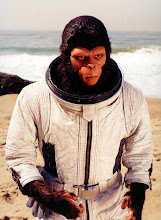A nagging question for most writers: What do people mean when they refer to a writer's "voice"?
The far too general answer we mostly get is "You know it when you hear it".
Simple. Efficient. True. But as a writer, doesn't help us much, does it? So let's dig a little deeper.
First let's define "voice" in its most basic terms. What are the attributes of a "voice"? Voices can be loud, soft, brash, clever, nonsensical, unassuming, powerful, direct, elliptical, poetic, etc., etc. To boil it down, essentially voice is something that defines itself above others -- awash in a sea of noise, a unique "voice" cries out. So maybe we can say at essence, voice is simply a unique or distinctive way of looking at the world.
If we're now looking at the world in a unique or distinctive way then it turns out "voice" is in fact a point of view. Now we're getting somewhere -- "voice" is a unique point of view. Serves well enough as a definition to me.
But all voices come from someone, so the next question appears to be: whose? Whose voice do we write with?
If a comedy is supposed to read like a comedy, a horror to read like a horror, a thriller to read thrilling etc., with whose voice/from whose point of view would be most appropriate to write? Your own? The protagonist's? The genre's? What if you're a angry person writing a comedy? Do you write with an angry voice because that's "your" voice, or do you try to fake funny? Do you write with the protagonist's voice? Maybe. What about what the story or genre dictates? Could that lead to cliche? Does anybody else think about this shit?
My last screenplay was a sunny action/comedy, my current is a dark fantasy. I can't use the same "voice" for both -- one is bound to sound inappropriate and false. So what's the solution? How do I stay true to myself and the dictates of my story and genre? There may be a possible key in the concept of "tone".
Every story strikes a particular "tone". I suspect the "tone" of a script/story can be defined as the result of the aggregate effect of a consistent "voice" from page to page. So again, whose voice do I use when working in disparate genres? And what the hell does my own personal writer's "voice" "sound like", anyway?
My fumbling-in-the-dark opinion is if voice emanates from the writer and is informed by the writer's thoughts and experiences, the "voice" one "hears" on the page must ultimately belong to the writer, BUT filtered through the essence of the main concept and genre in which we're working.
My personal history, my personal thoughts give me an unique or distinctive point of view, a particular way in which I see/imagine everything imaginable which no one else can duplicate. Therefore, when it comes to storytelling I have my own particular point of view and expectations of each genre. We all expect to see certain attributes in a horror film, but how I envision those attributes interacting and playing out is my own unique vision within the parameters of the genre (meaning if I'm writing horror, through scene setting, character action and word choice I describe the horror in the most cinematic way I can, if I'm writing suspense, my sentence structure and word choice should elicit suspense from the reader, etc.).
The buddy cop story, the troubled teen story, the serial killer story, they've all been done before. But HOW YOU do it must be in a way that only YOU can. Although we've seen all these stories a gadrillion times over, I have a unique ideal expectation of the attributes each scene in a particular story I'm trying to tell within a specific genre should possess. For example, maybe you think the Devil should be creepy. Maybe your parole officer thinks the Devil should be scary, while I think the Devil should be seductive. No one's right or wrong, everyone just has their own unique visions and expectations based on their personal points of view.
So within the descriptive blocks of my screenplays, I should strive to express MY unique point of view WITHIN THE PARAMETERS OF THE GENRE. If I do this consistently paragraph to paragraph, scene to scene, page to page, I will have created a unique voice which is my own, yet strikes the tone of the genre in which I'm working. The writing has achieved a unique point of view, and I, the writer, have expressed an original and distinctive voice.
If you want great examples of "voice" on the written page, check out any of the writings of Mark Twain, John Steinbeck, Chuck Palahniuk. Read some scripts from the Cohen brothers, Quentin Tarantino, Stephen J. Cannell, J.P. Shanley, Shane Black or the Wachowski brothers (I was also impressed -- from a "voice" point of view -- with the original screenplay for "Hancock", titled "Tonight He Comes", track it down if you can).
Don't just watch the movies, READ THEIR SCREENPLAYS!!! (If you're not constantly reading anyway, screenplays and otherwise, you have no business trying to write for a career) Care for them or not, all of the above have literary voices that practically jump up and smack you to the next page. There are many other writers with exceptional use of "voice", seek them out, study them, learn from them.
This stuff is by no means definitive, or even correct -- just my musings on "voice". If you have a better handle on it, let me know, I'm always looking.
10 years ago
